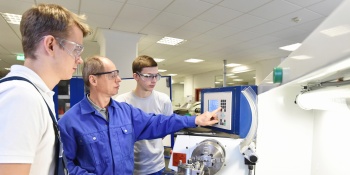
Semen sexing process.



Low cost

Quick Production

Protection
PROBLEM
The market demands technology for sexing semen that can be inserted into the frozen semen production industry. The commercial applicability of the process depends on the establishment of a technology that is compatible with the freezing method, minimum loss of spermatozoa during the process and that does not reduce the fertilizing power of the same.
SOLUTION
Compared with citometry, the sexing of semen by the proposed technology produces larger amounts of sexed semen with greater number of viable live spermatozoa. Production can be broadly expanded without loss of the purity of the separated spermatozoids, with very low equipment acquisition and maintenance costs. The improvement in quality and cost reduction of the semen sexing process would bring significant benefits, in the area of genetic improvement, to the very strong Brazilian livestock sector (cutting and milk), responsible for the supply of more than 6.6 million tons of beef and 20 billion liters of milk annually (ibge, 2009).

Idea

Laboratory

Prototype

Scheduling

Market







